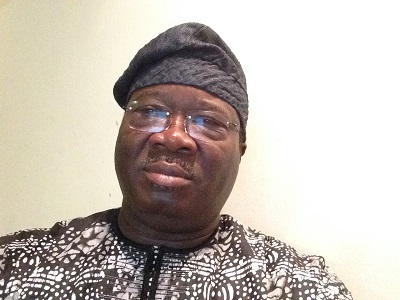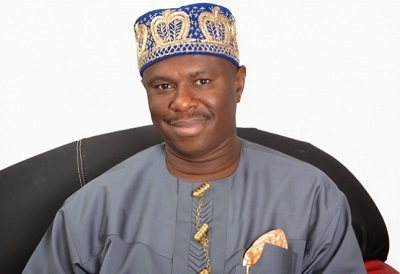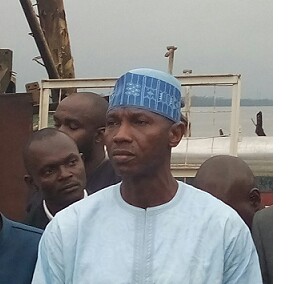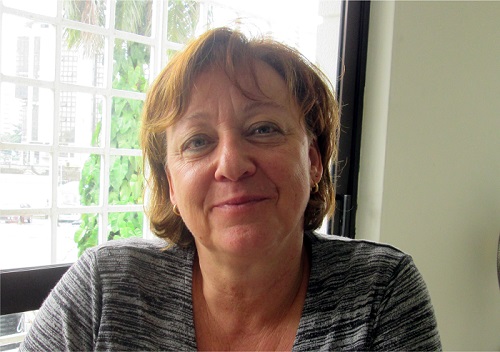Why NUPENG Is Opposed To Deregulation Of Downstream Sector
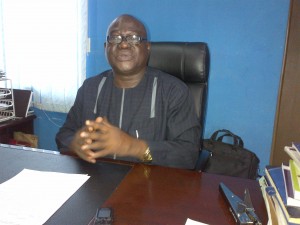
Mr. Isaac Aberare is the General Secretary of the Nigerian Union of Petroleum and Natural Gas Workers (NUPENG). In this interview, he states why the union is opposed to deregulation of the downstream sector, the factors responsible for the traffic gridlock in Apapa, his take on the sale of the assets by IOCs, how the union has been fighting the course of members and the possibility of NUPENG to own a railway coach for lifting of oil to avoid traffic congestions on the roads, he believes that value change orientation will g a long way to change the economy of the country, amongst other issues in the oil and gas sector of the country.
What are the activities of NUPENG since the beginning of the year?
NUPENG as you know is an industrial union and as an industrial union, we take care of our members that are employed in the oil and gas industry. Our activities from January till now has been delivering services to our members in any area where we have complaints from our members, we follow it up and if you look at the aims and objectives of the union, it is first and foremost to seek to unionise all oil and gas workers wherever they may be found. Then having unionised them, we negotiate conditions of service, collective bargaining agreement for them to take of their welfare benefits. Then, we also settle disputes between the workers and the management and between workers themselves. So, in a nutshell it encompasses our aims and objectives and in delivering these aims and objectives, we go into the field to organise workers, where there are complaints from them, we follow it up. That as it may, we from time to time organise workshops to educate our people and to create awareness on the right way to follow their grievances, so these are major things we do; we also make our contributions to influence government policies like when they sent the Petroleum Industry Bill for instance to the National Assembly, we submitted a position paper, we appeared before the committee to defend our position paper and we attended public hearing to drive our interest in that Bill. These are some of the things we do and which we have been doing from the beginning of this year till date.
Why is NUPENG opposed to the deregulation of the downstream sector of the oil and gas sector?
NUPENG is not opposed to the deregulation per se but we are opposed to the deregulation that is based on importation of petroleum products. If you want to deregulate, go ahead and deregulate but do not deregulate because you want to import. Nigeria is the 8th largest producer of hydro-carbon in the world and in our elementary economics, they told us then that industries are cited closer to the raw materials and if we are the 8th largest producer of hydro-carbon, why should we still be importing petroleum products at this 21st century? So, we have said the government should go and build refineries. If you build refineries, we are prepared to pay the cost of production of the petroleum products but not exporting our jobs to foreign countries then you bring goods for us to buy at the cost of their production. We will add insurance, add the freight rate, add demurrage to the cost of production and at the end of it; the landing cost is higher than what it supposed to be if we produce locally.
Why would government be bent on importing petroleum products since it will be cheaper if we produce locally?
Ask government that question. But we are saying no to that deregulation that is based on importation. You can now see the point of view of the union.
What do you think the union can do to ensure steady supply of fuel?
What we can do as workers is to go to our various places of work and make sure that production is going on. And as a union in the distributive channel of moving the product from one location to the other, we make sure that our members are there at all times to carry out their own responsibilities. So the product must be available for tanker drivers to move them from one location to the other. We are prepared and ready at all times to render that service to our nation but let government make sure they refine enough, let government make sure that the road network for tankers to move the product from location A to B is motorable so that the tankers don’t fall on the highway and kill people unnecessarily. We also avoid unnecessary strike action to delay production. This is our responsibility every other thing is the responsibility of the government and the owners of the facilities where these products are being produced.
About the traffic gridlock in Apapa, what is the union doing to salvage the situation because it has been severally alleged the tankers coming to lift oil are the ones responsible for the gridlock?
The issue of the Apapa gridlock has many contributory factors. One, the road leading to Apapa is not motorable. There are so many filled portions along the road and when there are filled portions along the road, movement is almost at a standstill. That is the position of the Apapa/Oshodi road. Then construction is still going on along the four lanes of the road; sometimes the express is blocked and everybody will be asked to use the service lane because of the construction and when everybody is passing through the service lane, you can imagine the traffic that will be on the road.
So, bad road is there, the construction that is going on is contributory and influx of trucks into Lagos to load products and evacuate containers makes the number of vehicles plying the Apapa/Oshodi axis to the port to be high. Majority of the functional depots are situated in Apapa and because of the inefficiency of PPMC, because of the vandalisation along the pipeline, products are not for now being pumped along the pipeline to supply products to the far north. So everybody comes to Lagos to load and if everybody is coming to Lagos to load, you must expect high volume of traffic. These are the causes of the gridlock along the road.
As for what we can do, we have co-operated all the time with the authorities, the security agents, LASTMA in making sure that the tankers that are parked along the road are evacuated. We have periodically asked our tanker drivers to park their trucks at the holding bay so that the only time they are expected to load is when they come to the port. That is what we are doing and at every stakeholder’s meeting, we are there to contribute our quota to make sure the roads are free and beside that, tankers are only group of people that are using the road. The trailers that carry containers are using the road which belongs to NARTO. Commercial buses too are also on the road; they also constitute nuisance on the road. The gridlock cannot be blamed on petroleum tanker drivers alone. Trailers going to carry containers or other goods in the port are also involved.
Is there any possibility of NUPENG owning railway coaches to lift fuel at least to decongest the road?
For asking that question, you are praying for NUPENG to be big, to be great and to contribute its quota to service delivery in this country. NUPENG having its own coaches to lift fuel is a business that is capital intensive that will involve a lot of money. In this country, railway business has not been deregulated in such a way that everybody can come into that business. Today, we have only one outfit that runs the Nigerian railway and that is Nigerian Railway Corporations, they own the tracks, and they own the coaches so there is no arrangement for now for NUPENG to go into partnership with anybody to buy coaches to lift petroleum products. We are not thinking about that right now; not that we cannot do it but we don’t have the resources to do it. We are only a trade union, we are non-profit making organisation.
What is your take on sale of assets by IOCs?
Well, for us we are not happy that the multi-national oil companies have divested from operations in Nigeria. They have reason for doing so and the reason has been premised on the volatility of the onshore and swamp location in this country because of insurgency and insecurity. They have found out that to operate an onshore or swamp location, they have many things to contend with in form of insecurity. They say they spend a lot of money trying to provide security for their facilities in this sub-sector and as a result, operating such facility is no longer profitable for them and what they need to do is to sell them to the indigenes who can always touch base with any aggrieved person to resolve and move out to the deeper offshore location to operate.
Ordinarily, we are not happy that they are selling our property, these are things they acquired at very small amount of money and they are selling and making huge sum of money. The sale is always occasioned with losses of jobs by people who are working in those locations. And the people are the members of the union that are basically affected; so it disrupts career projection for workers and the sale removes food from table of workers. We are not happy about the sale and we are not happy that the government did not put certain measures in place to sort out all the labour-related problems whenever any sale is being contemplated and that gave rise to complaint about what shell did between 2012 and 2013 that led to a nationwide protest against the sales of their onshore and swamp locations. The divestment led to losses of job of members to which we are against and we will continue to be against divestment and sale of our assets by multi-national oil companies.
What role can NUPENG play in the relocation of tank farms from residential areas especially Apapa and Kirikiri?
We are not the owners of the tank farms; we are not government that gave them licence to build those tank farms.
Then what is your stand on the location of the tank farms in those places?
Well, there are no tank farms in residential areas in Lagos. If you look at Apapa, as it were, right from West Minister to Tin-Can Island, where, the residential areas in those places.
What of the other side of the road?
There is a ten-lane divide between the residential area and the tank farms.
But any mishap will definitely affect the houses?
But that is not to say tank farms are built in residential areas. We have the tank farms towards the coast line and sea-ward on the right hand side of the Oshodi/Apapa from West Minister to Tin-Can Island. They may be close and tankers may park at the residential side of the road but to say they are built within the residential areas is not true. But I don’t like the way the tank farms are built around the operational areas where the tank farms are situated. They are too near and concentrated; there are congestions of tank farms in that place; that is what is also giving reason for influx of trailers going there to load. I think government should come up with a policy not to issue new licence for tank farms to be built in that place any longer. They can take some to Badagry, Epe where there are access to the sea rather than concentrate all of them in one place.
How well do you fight the course of any of your members who are unjustly treated?
If such a member is an employee of any of the oil companies, he ought to belong to a union and if he belongs to a union, the union will fight his case for him. There are people who want to eat their cake and have it, if anyone does not want to contribute to funding of the union and yet he wants to enjoy the benefit of the union; there is no free rider that you will agree with me. Nobody can be terminated for sustaining injury during the course of his duty because Employee Compensation Act has provision to cater for such person. Under our Nigerian Labour Law, every employee is covered with group insurance, so if he sustains any injury, the workmen compensation has provision to compensate that injured person. They will take care of his medical treatment and at the end of the day, he will be assessed based on the extent of his incapacitation and that will determine the amount that he will be paid.
On the soft side, what is your benefit about life?
I belong to those who will describe life as a place to be. You are born into a family, into a community, into a society to contribute your quota for the development of the society, I long to the group who believes that life is a place to be and I think I am happy to be in Nigeria, from Delta and from Urhobo ethnic community.
If you are given the mantle of leadership of Nigeria for one month, what will be your first assignment?
My first assignment will be to launch a campaign to change our peoples’ value system because the death of value has led to many things in this country; I will re-orientate people to change the value system in this country. If that is properly done, then meritocracy will be given its right place in the work place, corruption will be limited to the barest minimum; people will be encouraged to contribute their quota to moving the country forward. Value system will be the best thing to focus on then every other thing will fellow.



